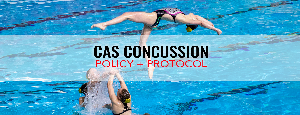
WHAT IS A CONCUSSION?
A concussion is a brain injury that can’t be seen on x-rays, CT or MRI scans. It affects the way an athlete thinks and can cause a variety of symptoms.
WHAT CAUSES A CONCUSSION?
Any blow to the head, face or neck, or somewhere else on the body that causes a sudden jarring of the head may cause a concussion. Examples include getting body-checked in hockey or hitting one’s head on the floor in gym class or on the side of the pool deck.
WHEN SHOULD I SUSPECT A CONCUSSION?
A concussion should be suspected in any athlete who sustains a significant impact to the head, face, neck, or body and reports ANY symptoms or demonstrates ANY visual signs of a concussion. A concussion should also be suspected if an athlete reports ANY concussion symptoms to one of their peers, parents, teachers, or coaches or if anyone witnesses an athlete exhibiting ANY of the visual signs of concussion. Some athletes will develop symptoms immediately while others will develop delayed symptoms (beginning 24-48 hours after the injury).
HOW CAN MY ATHLETE SUFFER A CONCUSSION IN ARTISTIC SWIMMING?
Artistic swimming examples: ‣ collision with teammate swimming laps, ‣ eggbeater kick to the head, ‣ elbow to the head, ‣ fall from a lift/highlight, ‣ hitting head on bottom of pool in shallow end (ex: ending of a figure) ‣ a hard fall onto the bum (in the gym, slipping on the wet deck).
WHAT ARE THE SYMPTOMS OF A CONCUSSION?
A person does not need to be knocked out (lose consciousness) to have had a concussion.
Common symptoms include: • Headaches or head pressure • Dizziness • Nausea and vomiting • Blurred or fuzzy vision • Sensitivity to light or sound • Balance problems • Feeling tired or having no energy • Not thinking clearly • Feeling slowed down • Easily upset or angered • Sadness • Nervousness or anxiety • Feeling more emotional • Sleeping more or sleeping less Having a hard time falling asleep • Difficulty working on a computer • Difficulty reading • Difficulty learning new information
![]()
CAS Concussion Policy
The new Canada Artistic Swimming Concussion Policy will be effective starting in September 2019. The purpose of this Policy is to provide the framework to create a safe and positive sport environment through education and training, and by making CAS Members, Registrants and Participants aware of artistic swimming-specific concussion awareness resources to assist in recognizing and managing a concussion injury.
https://artisticswimming.ca/wp-content/uploads/2019/06/CAS-Concussion-Policy-June-17-2019-EN.pdf
CAS Concussion Protocol
Canada Artistic Swimming has developed the Canada Artistic Swimming Concussion Management Protocol as a companion to its Concussion Policy to help inform and guide the management of artistic swimmers who may have a suspected concussion as a result of participation in Canada Artistic Swimming activities.
Please refer to page 12 of the document for CAS Concussion Pathway - i.e. 'what to do when your swimmer suffers an impact to the head, face, neck, or body'
https://artisticswimming.ca/wp-content/uploads/2019/08/CAS-Concussion-Protocol-June-2019-v.3.1.pdf
Please refer to the Concussion Policy & Protocol page on Canada Artistic Swimming's website for full details.
https://artisticswimming.ca/safe-sport/concussion-policy-protocol/
*excerpts taken from CAS concussion policy & protocol documents and website

